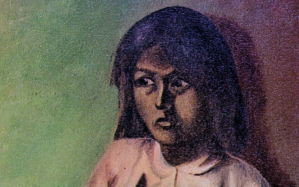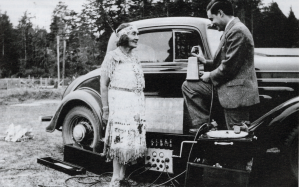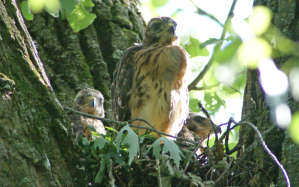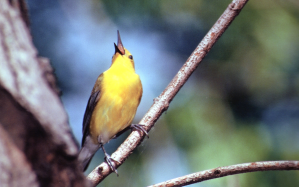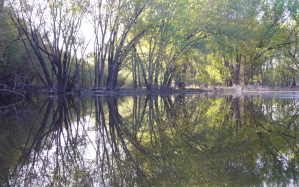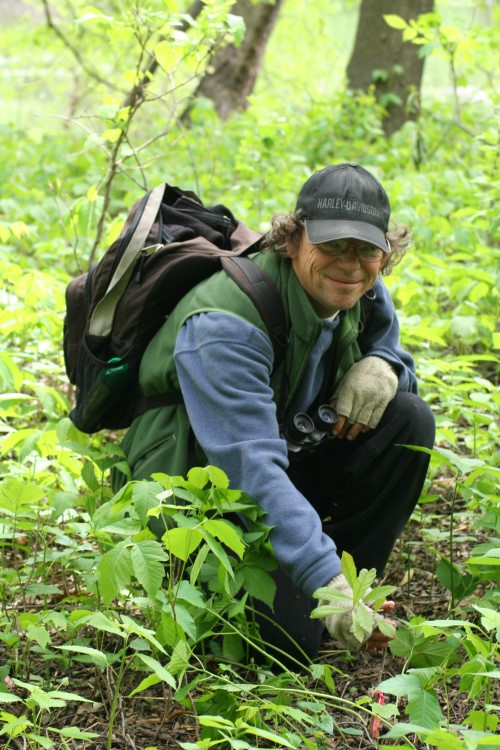Gloria Mundi Press website 2002
(Copyright 2002 by Richie Swanson)
Any other day Valerie came running through the stumps, knocking down fireweed and foxgloves, I would have thought a yardline had snapped or a rigger had fallen or some, new, chain saw had run itself across a faller’s leg. But last night the radio had said Japs wouldn’t put their emperor on war trial, and they hadn’t surrendered, so Valerie didn’t shock me none when she ran onto the splash dam’s deck and told me. “Jean Ellie, we dropped ‘nother one on ‘nother city, Nagasaki!”
She threw her arms around me as if the war were really over, won, but logs heaved and rolled against the dam, the river screamed like falls down a mountain, the deck shook, and the dam bowed out as if to bust, and I said the hell with the crew and winch coming. I got my dynamite and caps and went below the dam to a spruce rammed across the entire river, holding back a boom. Logs were splashing up two-people high, smashing down, but the spruce was wide as a sidewalk and took my weight firm as ground, and I chopped a notch and put in a bundle of sticks, and salmon flashed fins across the rapids, bumping against the spruce, thinking they could swim past the timber camp and the narrows where Otter Jack used to put his willow traps, so they could lay and fertilize and bury their roe.
I flung mud hard on the charge: Otter Jack always said I had been born a blue jay, meant to squawk and squabble and fly off, but ever since I was a girl, and I had got over the terrible quiet of his breath, I had said I had been born sorry too.
I lit the fuse and ran behind the rock with Valerie, and the blast shook the stone, banging through the valley, clapping off the hills. The roar whooshed up, chunks and splinters smashed against slash, and Valerie whooped cheers as we ran into the stink of the powder. The dam snapped back straight, the river-scream turned to a gurgling hum, and logs rushed lickety-split through the gate. On to Seal City Mill! To London! To France! To rebuild Europe!
Valerie gave me a giddy smile, and I felt proud as she climbed back to the cookhouse, knowing the crew could forget the winch and eat. But then chunks of salmon slumped down the bank, a mass of fish bobbed up dead between logs, and I imagined charred Japs floating in water, black stumps and lumps, black faces without hairs or eyes, and fires and rubble, and I hoofed above the road alone. I sat in a stump field, and down through the valley I saw the mill smoke billowing against the soot of sea clouds, and I thought of Otter Jack looking hard at a speck of gray in the sky last Sunday. He had stood above the berry bushes of his beach cliff, just a stick of an Indian ninety-years-old, his bullet-eyes flaming between swollen lids. His red-checkered hat blew off, and he barked into howling air. “Look, Ellie! Out past Thunder Rock! Five trees high!”
I put my berry bucket down and braced his back, and the speck got bigger and bigger like a blimp coming, but it got rounder, lighter-colored too. A hot air balloon near’ as wide as a rail car! It sailed above us just like a man-round-the-world balloon, but instead of bright colors, the cloth was white like a pleated blouse, and instead of the man-basket, a black ballast ring and sandbags dangled down from the ropes.
The balloon soared in the wind-roar above Otter Jack’s cabin and smokehouse, above his potatoes and beets, and then rip-whoom! It slammed against his cedar and fir and spruce, flames shot out the top, and the balloon shriveled and blew inside the trees.
The giant branches swayed in the wind like nothing had hit them: the stand was near’ three-hundred-fifty-foot high, a good eight-hundred-year-older than the state of Oregon itself.
I grabbed the back of his overalls, but Otter Jack hunched ahead and let the wind push him knock-kneed into the woods, and I shuffled after him, shoving through huckleberry, smelling tank gas, tasting it on my tongue. I told him I hadn’t heard of any Jap subs or mines on the coast lately, but we were fire-bombing their cities, and they would do anything to get us back, even send poison.
Otter Jack wiped wind-water from his eyes like he didn’t hear: the balloon had slung itself across a tall branch of fir, and the ropes and ballast ring hung beneath it in a shaft of green-gray shadow that vaulted up about halfway high as heaven.
“I’m going to get the Coast Guard,” I said.
Otter Jack saw all the government branches the same, and he damped his breath, shaking his head no.
The balloon swelled and then shrank again, and I thought I saw tubes like long tin cans and a box wound with wires beside the ballast ring. “Captain Davison’ll come,” I said.
Otter Jack squeezed his face tight, mocking the B.I.A. man who had first brought him papers. “What you?” said Otter Jack. “You Umpqua, you try Grand Ronde ‘Servation, you get your ‘lotment there. You born Takelma, you try at Siletz. You Coos, full-blood? You ‘titled twenty acre ‘tween South Slough and Empire Lumber section thirty-eight. You half-blood? No ‘lotment! What you? Lower Coquille? Upper Coquille? Rogue?”
He blinked like I had hurt him bad, like I didn’t know he was seventy-five before the B.I.A. had okayed him a place. “The government hear, they come like crabs from ‘neath rocks,” he said. “They poke that dirt and measure it. They put up radar, telephones, wires, poles, and then they push me out.”
Tick-a-tick. Tick-a-tick. Otter Jack didn’t hear, but jays glided across the top of the woods, a swarm a black-blue shapes jabbering soft inside the green-gray shadow. They lit on branches above the balloon, bent their heads as if to eye it, hopped down to it one by one and appeared to stick their bills into the cloth.
Squawk-a-wock! The jays flew off in a howl of wind, ropes blew, and I thought I made out a black nosepiece behind the hanging cans. “Look at it ‘gain,” I said. “Look at it good.”
Otter Jack spat and wrinkled up his cheeks nasty. “What you?” he mocked. “Who your father? Who your mother?”
* * *
I felt my wind die in me, felt weak and skinny and old as him, and then Valerie hammered on the cookhouse bell, ending lunch, and Dottie the whistle punk screamed from the road, making sure I wouldn‘t loaf. “Ellie, Jean El-lie!” And I sank against my stump, remembering Dottie’s girl-voice, “White House El-lie! Steam Train Smel-lie!”
Dottie had always dressed pretty at school, but one day after class she had bucked her shoulders like a bulldog, hollering from the wood-plank road, and I had snuck behind Auntie’s hydrangea, squeezing myself against the house. “White House El-lie!” yelled Dottie. “Paddle Wheel Nel-lie! Who’s your mother? Who’s your father?”
Auntie’s heels rapped on the street, and Dottie ran off, and then Auntie reared on our walk, steadying herself, looking proper for the phone company: black-beaded stockings, stiff black dress, white-ruffled collar, hair in waves that looked like wax. Auntie scowled after Dottie, and then her heels rapped up the walk, and she went up the steps crying, and I slumped beneath the bush and cried too.
Because Auntie had told all of Seal City how she had got me. Her sister had died, and Auntie had taken a train and had got off so near the Atlantic she had smelled the tide, and a church had me waiting in a white wicker cradle. Auntie had carried me up Pennsylvania Avenue, bumped by seas of people, and then gold-lace officers marched by, Marine and Navy bands played, and Calvin Coolidge approached from his inauguration, looking strained and dead-faced, standing in his car, tipping his hat humble.
Auntie lifted me above a streamer, and I shut my lashes so sweet the president laughed and nudged Mrs. Coolidge like he wanted to take me home. But he had just kissed the Bible at his speech, and he knew the Lord, the Eighth Commandment, and he saluted Auntie and went on.
Auntie hurried me to the train, and all along the Potomac and across the Ohio and Mississippi and Rockies I slept with such peace the porter wanted me, but the Lord told him too, the same Commandment.
Auntie boarded me on a stern-wheeler at Philo’s Landing, and all the way here Seal River fog drenched the deck, blowing salty and cold, and I fussed so little Captain Ames asked if he could take me. But the Bible was in his pilot house, saying so again. Thou shalt not steal, or thou shalt be punished.
White House El-lie. Stream Train Smel-lie. Paddle Wheel Nel-lie.
I hated the story, and then I near’ leapt from behind the hydrangea. Bullet-eyes flared at me from behind a cart of wood, peering from a withered brown face.
The old Indian had been spying on me I didn’t know long, his nose hooked so terrible, his lips set so still I didn’t move. I glared at him pushing his cart around the house, and then Auntie opened the door, and I ran in and hung my head.
“I have told you, Jean Ellie Osborne, hiding begets misgivings.”
I scrubbed my hands in the basin, sneaking looks out the window, watching Otter Jack stack logs by the fence.
“Did he call out to you?”
I spoke mannered. “He didn’t see me at all.”
“Indians don’t know soap. He doesn’t wash himself. He brings good wood, but you mustn’t talk to him.”
“I didn’t.”
“Indians pass disease. We mustn’t pay him any mind.”
Auntie gave me a scone, encouraging me to listen, to avoid him. But every day after school Dottie waited on a different street, itching to snicker and laugh, and I took to walking home behind the mill, and one day smoke came low through bushes, skunky-smelling, and I scooted past a sign. PROPERTY OF SEAL CITY LUMBER. I went along an elk trail and then sideways through sand pines, and I looked between trunks and saw a campfire of green limbs on a high bank, and Otter Jack bending beyond it, cutting something in his cart.
I ducked beneath a branch and lay down low on a needle-bed, knowing I shouldn’t, and then Otter Jack flicked an arm, and a ball of fat splattered in dirt.
Squeck-a-weck-weck! Weck-weck! A jay swooped down, snatching the fat, and another landed on the cart, and there was the sad-dog face of the dead seal, its chin flat against the tailboard, its eyes wet and black, glowing like they was still alive.
Otter Jack worked with a black-stone knife, and then he carried a heart in his hands, and he sat on a seat of black stones and sang strange words, looking down the river and out to sea. He got quiet as a candle, bowing and bobbing his head, chewing, and he went back to the cart, his throat moving like he had swallowed nothing more than clams.
Shells hung around his neck, bouncing against a mud-slopped mackinaw, and he put slabs of meat on sticks and stuck them around the fire. Jays crowded after him, and he tossed more fat from the cart and then stood with the bones of the seal and carried them over the bank, and I listened to my heart pound up inside my head, seeing a chance to go. But down at the river his voice chirped high like a fish hawk, and he sang, and then the bones splashed into water.
Jays boomed up sudden from the cart, and another man yelled below, “Hey, what the devil!”
Otter Jack came running, waving hands behind his head, batting at fists a-beating him. He crashed down on his chest, and a gray-vested man thumped on top of him, yanking his hair, ramming a pistol against his forehead.
“I tell you before?” said the man.
Otter Jack stretched up his chin, trying to nod.
“Burn fire here, who lose his job?”
“Watchman.”
“Who lose his brains?”
“Indian.”
“Where you make ceremony?
“Not here.”
“Where you sleep?”
“Not here.”
The man pulled the pistol away, took a nightstick from his belt, pushed Otter Jack’s face flat against the ground. The man climbed up slow from Otter Jack, and then he looked around fast, his eyes flashing big like a bear’s, bluer than the river. He dragged the cart and tilted it. Shoosh! The rest of the seal swamped the fire. Bonk! Bonk! Bang! The watchman sent the stone seat flying from his club and then stomped bow-armed down the bank, cussing.
His engine-string clunked and slapped, his boat roared away, and I gave out a breath. Otter Jack didn’t budge. He lay in a lump beneath a cloud of wet, dirty smoke, his eyes against the ground, his mackinaw not moving, not his cheeks either.
I felt a branch prickling my back, and I raised myself against it, a cat ready to scream or claw or scat, and then he looked up, needles and sand mashed across his skin. He spit grit from his lips, and then his gawk lit across the ground, flaming into me. “Jean Ellie,” he said. “Why you here?”
I held myself stiff, refusing to back down to any innards-eating Indian without no true home. “Why you?” I said.
* * *
I said the hell again. I told the boss that Auntie had so many war calls I had to help her at the switchboard. I got on the crummy and rode to town beside the Seal, and the river slowed against tidewater, got smoky with mist, and Chirrp! Chree-eee-eee! A fish hawk soared through fog, and I remembered Otter Jack shouting the cry, telling his Creation.
He had told me in Auntie’s garden digging up dirt. On his bench front of the hardware. On the beach watching tankers. On his dock of stove wood watching the Seal.
There was just fog and surf, not light, not darkness, not any life. A breeze blew. Seal Island Rock appeared beside the mouth of the river, jagged-looking and high as the cliffs above the beach.
Dawn glowed white behind the fog, and the rock glowed with specks like black glass, and Seal swam out from a crack, and he and his wife put pups along Seal River Bar.
But Seal and his wife got eyes that ran thick like Otter Jack’s, they wheezed, the tide came in, they floated to the beach. Vulture came, and the pups watched sad from waves. Sea Otter appeared from a hole in the rock, carrying a black-stone knife, and Puffin came out too, carrying fire.
Otter cut the skins, reached in for the hearts and got the wet webs between his fingers. Puffin blew on a wet-wood fire, and the tip of her beak turned red. Otter put slabs of meat over smoke, and Chirrp! Chree-eee-eee! Fish Hawk hovered above the beach and then took the bones in his claws. He dropped them over the river-mouth, fins flashed above the swells, and the pups leapt through the waves, eating salmon, growing big on the first run.
Two slabs of meat pulsed above the wet-wood smoke, shaking from surf-thunder, dancing. One became Man, one became Woman.
Man found a washed-up cedar and dug out a canoe with the black-stone knife. Woman found a washed-up spruce, split roots and wove a cradle, and the two paddled up the Seal River, and wherever camas grew for potatoes for salmon soup, they left a new band of Seal Indians.
But Man and Woman got runny eyes. They floated again to Seal Island Rock, dragged the canoe to the top, lay down in it and then crumbled with it, blowing into the sea.
And seal pups poked faces from waves, watching people as close as a mother, a father. People felt their own eyes get dark and heavy like Seal’s, and they put on Otter capes and Puffin hats. They danced to mother, to father. They sang for Seal to become Indian, Indian to become Seal. They sang many lives after deaths, they heard of Jesus men and Boston men coming, they saw copper and steel on the beach.
Whole families coughed blood, died of strange fever and pox, but trade ships avoided Seal River Bar and Seal Island Reef. Horses and wagons avoided Seal River Mountains, and even by the time of White Father Pierce, no settlers had come.
Still Mother and Father threw in bones, and the bands came to the river-mouth for salmon. Still dawn glowed white behind fog, Father paddled beside his fish dam, and Mother knelt above sand, blowing flames beneath her drying rack.
Squeck-a-weck! Weck-a-weck! Mother squeezed hanging fish, tossed a flake to a jay. Tick-a-tick. Buzz-a-buzz. She rubbed salmon meat, opening cracks to alder smoke. Squawk-a-wock! Wock! Mother looked up, a whisper running behind her. Flames climbed the cedar-plank house and the frame of Sister’s rack. A shot rang out, Mother flew backward. Pop! Father fell, the canoe splashed, Uncle dove. Another shot. Uncle sank, slapping arms between salmon.
Lodges burst apart, smoking, and horses pounded all around. Warriors ran out, and whites galloped from sea cliffs, raced along the river, trained muzzles from the marsh, threw torches. Children screamed in lodges, and whites stuffed cannons and shot and shot and shot.
Moans died inside the village and fish camps. Wails, even whimpers stopped, and the graves were begun.
The fog flashed yellow, booming, and Seal Island Rock flew around like pebbles. Grizzly Beards pulled planks from lodges, pounded them together above wheels, pried boulders onto the wagons, dumped and piled the rocks into a wall on Seal River Bar, and then a ship sailed safe into the river.
A baby cried, and Grizzly Beards approached a spruce-root cradle hanging beneath a cedar bough.
“Ugly little otter, ain’t it?”
“Hey, don’t kill it. Now we’n put him on a boat.”
“To where?”
“The last one? To a mission, I suppose, or a fort.”
“Anywhere they ain’t gold, and they ain’t pasture.”
* * *
Otter Jack had been a boy reaching into a fish trap on the Yachats Reservation, and a man had come out of beach fog, his eyes leaky like sap, shells shaking against a seed-sack shirt. His left hand had been gone, and Otter Jack hadn’t known if the man had been punished at a California mission, or if he had come from Grand Ronde or where, but he had talked about Seal Village. He had said Baby Otter Jack had been brought to Yachats Reservation, and Coquille women had given him their milk and had spit camas in his mouth, but then they had left to marry whites. He had told Otter Jack to give away his first salmon, his first elk and bear, and look out for Howling Woman who lived beside waves, ready to eat children who dared her.
The man had cooked crab in kelp and then had gone away as quiet as a back-slosh beneath mist: a dream or an exaggeration like the inauguration or maybe real as rock. I couldn’t decide, and then the crummy dropped me off and rolled away into gray soup, and I climbed across the jetty, and the tide seeped down, hissing soft between boulders. The black rocks glowed wet with shiny specks, and then Auntie yelled above me. “Jean Ellie!”
She stood on top of the jetty, cocking her feather-trim hat serious. “Did you…quit?” she said.
I felt so mean I didn’t answer.
“Why are you down there in the middle of the day?” she said.
“Why you?” I said.
She came down maneuvering her heels nimble between rocks, and she opened The Fir County Reader. NIPS ATOM’D AGAIN! “Mister Simpson sent me to get the extra.”
“Do you think they’ll surrender?”
Auntie pumped her head yes. “All the men will be back for their jobs, you know.”
Not those who had been rolled onto the dock inside pine, I thought. But I knew what she meant, and I shut my trap.
“Miss Barnes is engaged,” said Auntie. “She won’t teach next year, and no one charms children like you.”
I ignored her, spying Mister Simpson’s paper, thinking how the mill smoke towered up and up and then mushroomed before it sailed in immense clouds down the coast.
Auntie wagged her chin at the mill. “You watch, people will produce these new bombs like they produce floorboards and battery separators and cars. The companies will. The men will. You wait and see.”
She whisked herself back up the rocks, and wock-a-wock! I saw her as a blue jay too, bossing, knowing too much to ever marry any man, and all of a sudden I felt sad and responsible, and I watched Auntie go until a shiver shook me hard.
Who cared about a job anyway, about eating? Couldn’t we sing Yanks to become Nips, Nips to become Yanks?
* * *
The sun came out again and lit up logs all along the beach like bones, and when I climbed the cliff to the allotment, that ancient Howling Woman seemed to shriek a bomb-blast of her own, screaming wind through the big trees. I peered in: the balloon gusted up like a giant lung above the ground, whumping against trunks, jerking ropes tied to trees. It caved in and lashed huckleberry and devil’s club. It gusted full, caved in, gusted full…
Smells of grease, leeks and venison blew from the open door of the cabin, and Otter Jack slept inside, lying flat beneath a wool blanket, rasping heavy through his nose. Pieces of plump brown meat lay on his plate beside his bunk, and his right hand rested beside the blanket, the ball-bone enormous in the flaky skin of his wrist.
He smacked cracked lips and gave me a sudden grin. Game laws didn’t apply to his land, but I wanted to keep him fresh. “You been poaching?”
“She kept nosing the glue on the seams.”
“The balloon dropped down?”
“It near’ broke my arms, dragging me when I tied it.”
I told him about Japan, and he turned sulky, gawking out the door. “Blow up a city in a second?” he said.
I took his hand, feeling his fingers thin as trout bones. “Someone got to know ’bout the balloon.”
He gulped stubborn, wiping phlegm from his eyes.
“It might a’ come from a ship or sub,” I said. “Or from a plane, and maybe’s there’s more.”
“Look in my box,” he said. “Look in it good.”
I knelt in the corner beneath his coat hooks, opened his old tool box, saw it jammed with fat white envelopes. “You sign for these, and you don’t read ’em?”
He grunted, and I opened the latest letter. The county wanted land taxes, and he had missed court dates.
Title to the west half of the southwest quarter of
section twenty-four, Cape Francis Drake Township,
was sold to Seal City Lumber, August 1, 1945.
Jackson Taylor Ottman must vacate property in thirty days.
Otter Jack sat up, mummying covers around his neck, and I wanted to bust something in half: bigwig signatures, tiny print, my rising blood, the county seal, the mill itself.
“How they want me to work? To pay? Tell me, Ellie!”
“Tell you? Whyn’t you tell me! I would a’–” Done what? Given him, not Auntie, money every month?
He stared at me, rasping slow. “I didn’t think they would ever–”
“I’ll figure.” I went outside and watched waves glimmer clear across the Pacific to Nagasaki, and then I got his ax and went back into the trees. The balloon whipped around, and I followed the clinks of clips until I saw the ballast ring lying across a downed cedar, the sandbags heavy on the crumbling wood, the tin-can bombs like tubes of shadow.
I hacked his knots, and the balloon collapsed complete and yanked at a couple, long, chunky wires I wouldn’t dare chop. Springs and disks and coils were littered all around, a crack in a battery case showed the last of some leak, the dry cell looked dead. Jap labels run across the can-bombs, a pinhead stuck out halfway down each, and one bomb was bigger than four others, ugly with a nosepiece, lined with hard-glass slots filled with yellow crystals that looked wicked as Hitler, hideous as Hirohito.
I saw no pinhead on the big bomb, so I hacked huckleberry branches, snugged a little bomb against the crystal one and then tied them tight together, figuring the small bomb would ignite the big. I lugged them both out the back of the woods, feeling them cold as tide rocks against my gut, and I laid them beneath the gate of the stump field that sloped down to Roosevelt Highway. PROPERTY OF SEAL CITY LUMBER.
The watchman would come this way, I was sure, and I dug a hole with the ax and set the bombs easy in. I peeled apart a branch-tip and threaded it around the pinhead, and I knotted the other end of the huckleberry branch to the bottom of the gate, sweating, sighing against any flinch. I let dirt trickle from my fingers onto the bombs and then leaned limbs against the gate, so the wind wouldn’t trigger nothing, and pop! A muffler spat down at the bottom of the stumps, an Army-issue jeep revved its way up the hill, and I got up slow above the branch, wiping my hands.
The jeep stopped, and Harold J. Jameson got out, blond hair blowing fine above a big broad forehead, shoulders lurching up burly in his dark Swede suit. Mister Seal City Lumber himself, controlling partner. He approached the gate, looking at me like I didn’t belong, and I barked to stop him. “There’s a new Jap weapon here!”
“We know, Miss Osborne.”
I nodded sharp, and he pulled up short, seeing a rim of the little bomb sticking out of dirt. He began to turn, and I barked again. “Go on, get your law!” I edged my foot nearer the branch, and Jameson twisted up his mouth like Auntie would. “See if I won’t stomp down, and I didn’t learn my work,” I said. Jameson stood back a ways, gauging me, and then there were taps like raindrops hitting dust.
Squewk-a-weck! Squewk-a-weck! A jay lit on the ground, cocking its head toward a raw nub of meat. I turned halfway around, and Otter Jack came out of the woods, ripping deer flesh like I have never seen, tearing it wild, throwing pieces everywhere. He glowered at my heel poised above the branch, and I knew he had seen what I had taken from the balloon.
His bullet-eyes flamed at Jameson. “You think you got the right to steal these trees and drive me off?”
“We bought the land, but we won’t force you off,” said Jameson. “We’ll see to it you can stay in your cabin.”
“Fancy that,” I said, and weck-weck-WECK! Jays dropped out of trees, and one lit top of the fence, eyed a limb against the gate and then flapped down beside my foot. It looked up at me, a chunk a meat hanging from its bill, and I held still, and it hopped beneath the branch and stuck its bill into the far end of the dug-up dirt. It poked the bill in gentle until the meat was buried, and it pulled its bill halfway out, and then it froze, feeling the heat of our stares and maybe even the horrible warm bubble rising inside my skin. The wind fluffed up feathers on the jay’s back, but it was just like a hawk was staring down from a spruce. All the jays were dead quiet, their black eyes glowed extra bright, they did not blink. My ankle got stiff. My boot got heavy. In my mind I heard Otter Jack. “Jean Ellie, what you?”
“Bastard bitch,” muttered Jameson. “Illegitimate–”
I crumpled inside, the air flashed blue, I was hurled high by a banging blast. I saw my arm in its sleeve shoot past a face of blood, saw Jameson split apart, Otter Jack’s legs splatter against one tree, his head and chest smash against another, and blackness fell around me, I was dead, but a hot-bloody brine rushed down my nose, and I beat my tail hard and swam up toward a watery red glow, and I poked my head above popping waves, and Jameson muttered again. “Your damned jay hit your damned branch.”
We had turned into seals, all right, but a hot goo bubbled across our cheeks, it poured like burning oil against our bones, and we died again. We swam up and poked out our heads again, and everywhere we looked, steaming flesh floated from wiggling salmon, and men and women and boys and girls cried out and sputtered pus, rolling as thick as bloated beans in stinking soup. Our cheeks bubbled, our bones boiled, we died and came up again and again. “Why in hell?” said Jameson.
We swam backward and saw cedar-plank lodges burn on the beach and the rock blow high at the mouth of the river.

